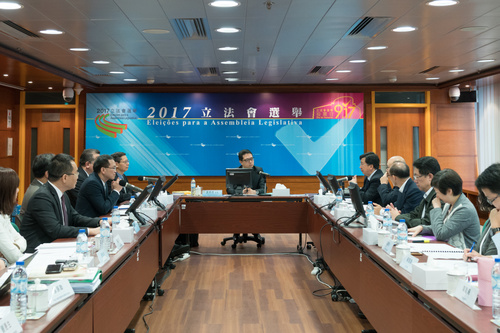 The Electoral Affairs Commission for the Legislative Assembly Election holds a meeting with representatives of the Environmental Protection Bureau.
The Electoral Affairs Commission for the Legislative Assembly Election holds a meeting with representatives of the Environmental Protection Bureau.
The Electoral Affairs Commission for the Legislative Assembly Election plans to set limits to the levels of noise that can be produced in public places during campaigning period, in a bid to mitigate the risk of noise pollution and to protect the community from excessive noise.
The Commission hoped to achieve a balance between the promotion efforts of campaign teams and the variety of lifestyles in the community, given that a number of people work shifts on behalf of round-the-clock services, said today the Chairman of the Commission, Mr Tong Hio Fong.
Mr Tong was briefing the press today after a meeting with representatives of the Environmental Protection Bureau to exchange views on issues associated with the election, an event to be held on 17 September.
To regulate the level of noise of campaigning events would be relatively difficult; the authorities would instead take into consideration the scheduled time of any proposed event, in order to check whether it might be prohibited by existing regulations.
The authorities deemed it was possible to have a control on the maximum sound function of audio equipment in broadcasting vans used by campaign teams. The Environmental Protection Bureau would advise on this matter after a complete review.
The Commission noted that campaign promotion via broadcasting vans or via use of other equipment were rights of campaign teams; and hoped members of the public would show understanding regarding the teams’ participation in the Legislative Assembly election, an event considered one the most important in Macao.
Mr Tong also spoke about a meeting held on Tuesday (28 March) between the Secretary of the Commission and representatives from the Macau People with Visually Impaired Right Promotion Association. It was to discuss issues relating to special design of ballots and of voting procedures for people with impairment to their sight.
The Commission would take heed of the Association’s suggestions and planned to meet three other local associations representing people with specific needs, in order to hear their opinion.
The idea of designing a ballot specially for sight-impaired people was to allow such people an alternate route for casting their respective votes: they can, if they prefer – and as in previous elections – ask for assistance in casting their vote from someone they trust.
Regarding the allocation of polling stations, Mr Tong said the Commission would choose schools and facilities of public entities as ballot stations; the Commission was still looking for some appropriate venues given that some venues used in previous elections would be undergoing construction work at the time of the upcoming election. The Commission planned to operate around 33 polling stations, and possibly one or two more.
A voting station should be easily accessible to voters and have facilities that could be used by the public free of charge; the Commission also needed to consider the question of allocating polling stations proportional to the number of voters in each district, in order to ensure the smooth operation of polling stations, added Mr Tong.
In addition, the Commission had received an invitation to meet members of the Association of Portuguese and English Press in Macau (AIPIM). Mr Chan Chi Ping, a member of the Commission, had – with authorisation from the Commission’s Chairman – held a meeting with AIPIM representatives in order to gain a better understanding of issues that AIPIM wished to raise.
AIPIM’s enquiries basically covered issues that had been previously discussed during a meeting held on 8 March between the Commission and representatives of local media outlets, said Mr Chan. Most of the questions had been answered at the meeting on 8 March.
The revised Legislative Assembly Election Law does not include any amendment on regulation of social communication, or any specific provision regarding protection of the freedom of the press. The Commission is happy to keep in contact with AIPIM, in order to address any issues that are of concern to the organisation, added Mr Chan.


